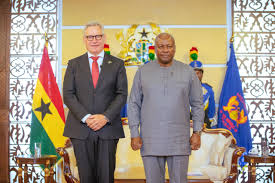Rune Skinnebach has officially assumed office as the new Ambassador of the European Union (EU) to Ghana after presenting his Letters of Credence to President John Dramani Mahama at the Jubilee House in Accra.
Before the ceremony, Ambassador Skinnebach presented his Open Letters to Ghana’s Minister for Foreign Affairs, Samuel Okudzeto Ablakwa, marking the formal start of his diplomatic mission in the country.
The envoy’s appointment comes at a critical time as Ghana and the EU seek to deepen their long-standing cooperation across trade, security, governance, and sustainable development.
Both President Mahama and Ambassador Skinnebach reaffirmed their commitment to strengthening bilateral ties, with focus on building on decades of collaboration.
Speaking after his accreditation, Mr Skinnebach described Ghana as a preferred trading partner of the European Union and expressed confidence that his four-year tenure will further enhance relations. He pledged to work towards positioning the EU as Ghana’s primary security partner and political partner of choice.
The new ambassador also highlighted EU support for Ghana in key sectors such as youth development, education, and sustainability. According to him, these areas reflect the Union’s long-term vision of creating opportunities for young people and promoting inclusive growth.
Ambassador Skinnebach is a seasoned diplomat with more than 20 years of service in the EU’s external relations. He previously served as EU Ambassador to Malawi, Deputy Head of Division for Pan-African Affairs at the European External Action Service in Brussels, and Head of the Political, Press and Information Section at the EU Delegation to Zambia. He began his diplomatic career in 1994 at the EU Delegation in Ghana, an early posting that exposed him to the dynamics of Ghana-EU cooperation.
He takes over from Ambassador Irchad Razaaly, who completed his duty tour last month.
Ghana and the EU have shared strong political, cultural, and economic ties since Ghana’s independence in 1957. Over the years, this relationship has been formalised through multiple trade and development agreements that continue to shape economic collaboration.
One of the cornerstones of this partnership is the EU’s Global Gateway Strategy, which supports Ghana’s efforts towards sustainable and inclusive development. Under this framework, the EU has backed projects focused on green growth, sustainable cities, good governance, and national security.
In trade, Ghana is one of the few West African countries with both an interim Economic Partnership Agreement (EPA) and a Voluntary Partnership Agreement (VPA) on legal timber trade with the EU. The EPA grants Ghana duty-free and quota-free access to the European Union market for its exports, while requiring Ghana to gradually open its market to about 80 percent of EU products between 2021 and 2029.
This trade arrangement is designed to promote sustainable development, enhance competitiveness, and strengthen Ghana’s role in global markets. The VPA, on the other hand, focuses on ensuring legality in timber exports, an area where Ghana has been commended as a leader in the region.
Beyond trade, the EU has invested heavily in Ghana through funding, technical assistance, and policy collaboration. Recent commitments under the Joint Programming Document for 2021-2027 show that the EU, working through Team Europe, is prioritising Smart, Green and Digital Recovery.
Key initiatives include rehabilitation of the Kpong Dam to boost power generation, support for vaccine production and health security, energy transition programmes, and green finance for private sector development.
Ambassador Skinnebach’s arrival signals continuity in these efforts, with expectations that his extensive experience in African diplomacy will help address common challenges such as climate change, youth unemployment, and security threats.
As Ghana continues to navigate global economic pressures, its strategic partnership with the EU is expected to play a vital role in driving trade, investment, and innovation. The EU remains one of Ghana’s biggest development partners and is increasingly positioning itself not only as an economic ally but also as a political and security partner.
With his diplomatic background and familiarity with Ghana, Mr Skinnebach is anticipated to build on his predecessor’s work and ensure that the Ghana-EU partnership continues to deliver tangible benefits for both sides.
